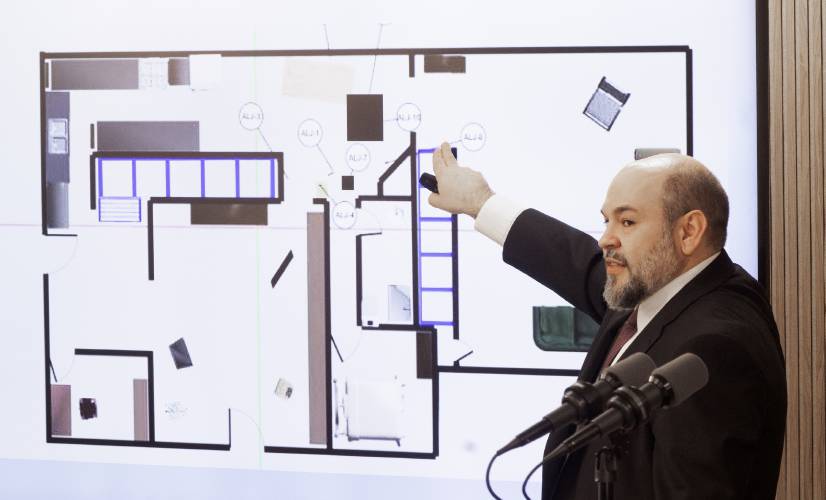How can police better respond to mental health crises? New Hampshire’s review process stops short compared to neighboring states.

Senior Assistant Attorney General Benjamin Agati shows the layout of the area of the officers involved in the fatal shooting of Misha Fay on Jan. 1, 2023, in Gilford. GEOFF FORESTER / Monitor file
| Published: 02-17-2024 6:45 PM |
Shandi Elliott refuses to call the police when her teenage son faces a mental health crisis. She doesn’t want her son to end up arrested or hurt. Instead, she pins her hopes on the state’s mobile crisis unit to step in and help de-escalate the situation, even in emergencies.
“I’ve always tried not to call the police, even though people say you should have,” said Elliott.
Since her 17-year-old son received his mental illness diagnosis five years ago, Elliott has taken proactive measures, like securing knives in their Wilmot home to try and prevent crisis situations. She avoids dialing 911 even when her own safety has felt compromised.
“I know they’re trying to get them trained,” Elliott said of police. “I was terrified of people showing up and arresting him because he was destructive and belligerent and out of control.”
From her experience as a former EMT, she knows firsthand that police intervention doesn’t always lead to positive outcomes in mental health crises. She believes in a different approach — one where help doesn’t come with the added risk of arrest or the use of deadly force on her son.
“It’s my son, and I love him. And I know he can be very sweet and kind when he’s not in a bad place,” Elliott said.
When it comes to changing how emergency response systems navigate cases like hers, she had a message for law enforcement: “Have an open mind.”
Frequently, when law enforcement is called to intervene in a crisis, the outcome is costly for all involved.
Article continues after...
Yesterday's Most Read Articles
 Concord’s Giant Indoor Yard Sale returns
Concord’s Giant Indoor Yard Sale returns
 On the trail: Gov. Ayotte says she delivered on her promises in her 100 days in office. Not everyone agrees
On the trail: Gov. Ayotte says she delivered on her promises in her 100 days in office. Not everyone agrees
 ‘People just want to speak up’ – Another large anti-Trump weekend rally in Concord
‘People just want to speak up’ – Another large anti-Trump weekend rally in Concord
 Stalled seasonal visa system cancels Concord’s Kiwanis Fair scheduled for next month
Stalled seasonal visa system cancels Concord’s Kiwanis Fair scheduled for next month
 Texas veteran joined his sister in NH, hoping to find housing. He died while homeless less than a year later
Texas veteran joined his sister in NH, hoping to find housing. He died while homeless less than a year later
 Epsom lawmaker proposes slot machines in restaurants and bars to boost state revenue
Epsom lawmaker proposes slot machines in restaurants and bars to boost state revenue
About two-thirds of the people killed by police in New Hampshire in the last decade struggled with mental illness, according to a Monitor analysis. In both Maine and Vermont, where similar trends exist, a board combining the voices of law enforcement, mental health advocates and citizens with lived experience looks into every such instance through a lens of prevention and makes recommendations for systemic improvements.
In New Hampshire, despite some momentum to create such a body, none has come to fruition.
“I’m sorry, nobody’s picked that up,” Bob Giuda, a former state senator who unsuccessfully tried to create one when in office. “The Attorney General’s review is only from the point of view of was the shooting justified. Not was it necessary? Could something different have been done?”
Alongside increased funding for officer crisis intervention training, New Hampshire passed a law in 2022 forming a committee of lawmakers to study whether the state should establish a mental health incident review board.
With input from law enforcement, mental health advocates and the American Civil Liberties Union of New Hampshire, the study committee found that “the establishment of such a committee would serve to be beneficial to all parties involved including the officers, the individual involved in the incident and the families of both parties.”
Per the committee’s recommendation, the review board would not duplicate other reviews, such as those from the attorney general or individual departments, or have any kind of punitive powers. Aimed at prevention, its focus would be on examining the mental health aspects of incidents where police used deadly force and “developing best practices for law enforcement and mental health services.”
But creating such a review board requires new legislation. No such bill has been filed since the committee finished its work.
“I don’t know that you’re going to find a senator or representative that understands much of this and is willing to bring forward legislation,” Giuda said.
Since the bill was introduced in the legislature, five people with mental illnesses or in mental health crises have been fatally shot by law enforcement in New Hampshire. Three of those occurred after the study committee recommended the creation of a review board.
Law enforcement and health care systems have translated the review board’s recommendations in Maine and Vermont into both broad and commonplace changes.
“I think the committee has been instrumental in the state developing its new use of force policy, where we take a little more time to de-escalate situations, take someone’s mental health into consideration whenever possible,” said Chief James Pontbriand, representing the Berlin Police Department in Vermont and a member of Vermont’s Mental Health Crisis Response Commission. “That’s definitely reshaped our training quite a bit and put an emphasis on de-escalation and mental health.”
In Vermont, certain police departments have integrated mental health workers into their operations. With the new use-of-force policy in effect, depending on the circumstances, officers first attempt to establish contact with individuals experiencing a mental health crisis over the phone if they are at home, gauging their willingness to access mental health resources and ensuring the safety of everyone involved. However, if the individual is in a public location, officers try to initiate in-person contact.
Pontbriand acknowledges officers’ reluctance but views these boards as indispensable tools, similar to domestic violence review boards, which can be “used as a lesson.”
In Maine, more than 60% of the police departments involved in cases reviewed by its Deadly Force Review Panel reported at the end of 2022 that they had adopted its recommendations.
Building trust with law enforcement through communication played a big part in that, according to Francine Garland Stark, executive director of the Maine Coalition to End Domestic Violence, a former member and chair of Maine’s panel.
“I think there was a certain amount of concern on the part of law enforcement that this panel was going to engage in making comments, recommendations or observations that would be severely critical of law enforcement and make their lives more difficult in an already very difficult time,” Garland Stark said.
The panel’s discussions are entirely confidential, but it releases a report after each case and at the end of every year, which Garland Stark said are shared directly with departments across the state.
The recommendations “were offerings of information, as opposed to judgments,” she said. “Once departments started seeing them, they were like, ‘We actually find these to be really interesting observations, interesting insights.’ ”
The panel began its work in 2019. While its scope goes beyond incidents involving a mental health component, the vast majority of the approximately 30 cases it has reviewed qualify as such.
As a result of recommendations made by the deadly force panel, Maine police departments have increased officer awareness and training around engaging people with mental health concerns, added equipment to support less lethal officer intervention strategies, strengthened relationships and communications with local mental health agencies, put mental health specialists on staff and improved support and stress management for officers who use lethal force, according to the panel’s 2022 annual report.
“We really worked hard to make sure that all of our observations and recommendations were thoughtfully articulated, factual and practical,” Garland Stark said. “Our job was to look at the incident and see what else we can learn.”
How law enforcement leaders in New Hampshire feel about this proposal is unclear. Of those the Monitor attempted to reach for this story, including representatives from N.H. State Police, the Department of Safety and the Association for Chiefs of Police, most did not respond to interview requests, and those that did would not comment substantively on the concept of a review board.
“Our interactions with those in mental health crises, and the well-being of our employees, are of critical importance to me,” said Safety Commissioner Robert Quinn. “As a department, our goal is to deliver the greatest service we can to those in need and support efforts that provide for the safety of Granite Staters.”
In testimony to the study committee in 2022, law enforcement officials expressed apprehension about its intentions and pointed out existing improvements already made in the state, from local awareness initiatives to increased enrollment in crisis intervention training.
When an officer uses deadly force against someone, the system has already failed both parties, Russell Conte, a major-turned-wellness coordinator with State Police, told the study committee, according to its minutes. A review board should focus on building better bridges with healthcare systems, not judging how first responders acted in the moment.
The decision to use deadly force is a life-changing one for officers, John Scippa, director of the New Hampshire Police Standards and Training Council, told the study committee.
If a review board said things officers could have done better and that information becomes public, he continued, it could hamper transparency from police.
“For a committee to sit down and pick that apart, it could be detrimental to what the mission of the committee is,” he said, according to the committee’s report.
When asked in an interview about a mental health incident review board, Scippa responded, “I think that the concept certainly deserves further review.”
Sen. Tim Lang sponsored New Hampshire’s study committee bill in 2022. He and Sen. Sharon Carson, who chaired the study committee, have been trying to draft and file legislation implementing the review board since the committee’s recommendations were released, Lang said.
Carson did not respond to interview requests for this story.
Lang, a former nine-year member of the Northfield Police Department, said he believes a review board would improve existing processes for law enforcement to update policies and training.
“But it’s not just law enforcement,” Lang said. “The whole idea of that commission would be not only any gaps in law enforcement but gaps in mental health care.”
Existing reviews like the Attorney General’s are thorough, but they solely focus on whether law enforcement responses were legally justified, failing to capture the broader perspective that a review board could provide, said Susan Stearns, the executive director of the state’s chapter of the National Alliance on Mental Illness.
A mental health review board would play a key role in identifying potential mental healthcare improvements, such as how to allocate different resources or ways to better identify early signs of mental illness in educational settings.
“What we’re really missing is, what happened to cause law enforcement to be put in that position on that day?” Stearns said. “How do we learn from these tragedies in order to prevent them?”
Navigating both privacy laws and the state’s public access laws has been the primary obstacle to establishing a study committee in New Hampshire, Lang said.
“It’s still a bill I’m interested in getting done,” Lang said. “We just haven’t got there yet — doesn’t mean we won’t.”







 Weekend clean-up was part of Earth Day celebrations
Weekend clean-up was part of Earth Day celebrations McKee Square Rite Aid sold, staying put
McKee Square Rite Aid sold, staying put Hospitals sue state over NH’s Medicaid tax
Hospitals sue state over NH’s Medicaid tax Federal officials to review Bow parents’ free speech lawsuit regarding transgender athletes
Federal officials to review Bow parents’ free speech lawsuit regarding transgender athletes 
